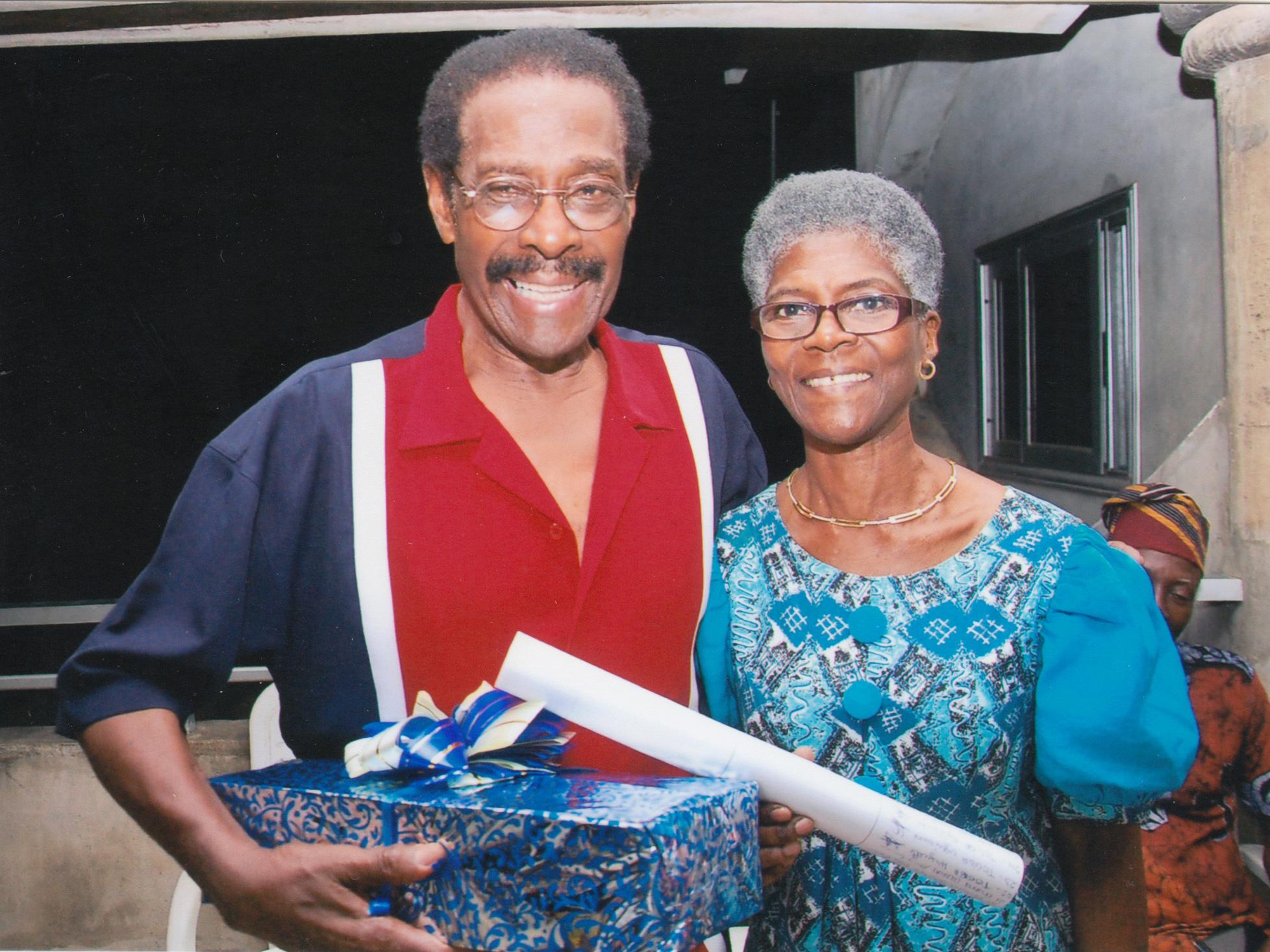International honor -- SUNY Oswego Distinguished Service Professor Alfred D. Frederick of the curriculum and instruction department recently was honored by the African nation of Benin for his more than two decades of impact on the country’s education system. Benin’s former Minister of Primary and Secondary Education Evelyne Sossouhounto Kaneho celebrated his contributions and offered gifts of thanks.
SUNY Oswego Distinguished Service Professor Alfred D. Frederick recently was honored by the African nation of Benin for more than two decades of tremendous impact on the country’s education system.
A six-time Fulbright scholar, Frederick was honored in a Jan. 16 ceremony that included an original tribute song and video, praise from education officials, support from many friends and former students, and general recognition of the contributions in educational publications and in the schools the Oswego professor has provided since his first Benin visit in 2000.
A member of the college's curriculum and instruction faculty, Frederick has made cross-cultural communication, understanding and education his passion and life’s work. He started as a science educator in Chicago and has since worked on four continents, often on developing and providing training in cross-cultural education and culturally relevant teaching.
“Culturally relevant education is using the knowledge base of your students, having examples to bring a level of understanding to the students,” wherever in the world you might be teaching, Frederick said.
This could be something as simple as using a ball to demonstrate the pull of gravity or other aspects of physics. The concept echoes the object learning method that the college’s founder Edward Austin Sheldon championed that helped revolutionize education in the 19th century.
At the ceremony, Benin’s former Minister of Primary and Secondary Education Evelyne Sossouhounto Kaneho recounted the many contributions Frederick has provided to the country, its teachers and students in the past 20 years.
“It was very emotional,” Frederick said.
‘Significant contribution’
Frederick provided a “significant contribution to the improvement of the Beninese educational system and teacher training,” Le Nouvel Observateur, a Benin newspaper, reported in covering the ceremony. “Since his arrival in Benin in 2000 as a Fulbright scholar at the Universite de Abomey-Calavi, Dr. Frederick has enlightened teachers and students to an awareness of the inadequacies of the eurocentric male-defined curriculum, especially concerning the lack of social justice for all students, especially the education of women and girls.”
The newspaper added that the evening “included testimonies, cultural activities and speeches, as well as presentation of a certificate of recognition. In short, everything resulted in a colorful evening. Present were students from SUNY Oswego led by Dr. Marcia Burrell.”
After Frederick presented his initial research of the country’s educational system in 2005, the education minister at that time, Rafatou Karamou, asked him to continue the collaboration to help improve their teacher training program.
Frederick’s ongoing work resulted in the book “Bridging the Gap Between Home and School: A Paradigm for Monitoring, Assessing and Improving the Schooling Process for Culturally Diverse Student Populations,” sponsored by the U.S. Department of Education. USAID sponsored the third edition of the book at Benin’s request, which furnished 9,000 copies to Benin’s teachers free of charge.
“I think that was one of the biggest contributions to teacher training, and I’m happy about how it served the teachers,” Frederick said. “My contributions to education have been through my teaching and research via the book, which offers comprehensive pedagogical suggestions that will enhance the pedagogical practices of teachers as culturally responsive practitioners.”
Between 2006 and 2009, Frederick organized and accompanied four teams of professors past and present from SUNY Oswego to Benin. In addition to Burrell, participants included Barbara Beyerbach, Dennis Parsons, Susan Gilmour, Bernard Boozer, Harrison Yang, Bonita Hampton, Patricia Clark, Barbara Streets and Eugenio Basualdo. Frederick also brought Cindy Ewers from the University of New Mexico and the renowned author and culturally relevant teaching educator Geneva Gay from the University of Washington.
Le Nouvel Observateur noted that Frederick “believes in the need for cross-cultural communication, interrelating the culture of the learners, their gender, the diversity of religions, ethnicity, the uniqueness of each learner, mutual respect between learners, teachers and administration.”
“In addition, he speaks of the climate that must exist between all these actors of education for the smooth running of work,” the Benin newspaper added. “If education suffers, the whole nation is in danger, so it is worthwhile to evaluate the quality of education carefully.”
Frederick has been honored closer to home many ways as well. In 2015, the International Center of Syracuse presented him its 2015 Outstanding International Educator Award for, among other things, his ongoing efforts to connect SUNY Oswego students with cultural and other activities in the community.
After that event, Frederick was proud to receive a letter of recognition from U.S. Sen. Kirsten Gillibrand that read, in part: “Your efforts to improve cultural understanding and to help those abroad are remarkable. I commend your hard work and dedication to the international and local communities. Your work as a Fulbright scholar and distinguished service professor has inspired so many of your students and colleagues to pursue work in international and intercultural relations. I am proud to serve as Senator to such a committed individual.”
Frederick also cherishes a letter of commendation from then-Mayor of Syracuse Matthew J. Driscoll when the professor earned a Syracuse Post-Standard Achievement Award. “Through project CLIMB,” Driscoll wrote, “you have been able to link students and faculty worldwide; connecting Central New York with the global community.”
For Frederick, any recognition, including the ceremony in Benin, marks a milestone more than a culmination. He will continue working with students in Oswego and across the world to promote cross-cultural communication, understanding and education.
“That’s my dream,” Frederick said. “That’s a continuing process, really.”




